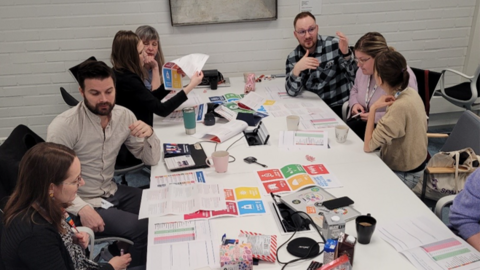Espoo wants to integrate sustainability into everything it does
Espoo wants to achieve the UN’s Sustainable Development Goals as a pioneering city. This article tells you about the development work carried out by the city organisation to enable sustainable development.
Espoo wants to achieve the UN’s Sustainable Development Goals as a pioneering city. This article tells you about the development work carried out by the city organisation to enable sustainable development.
Sustainability is strongly present in the City of Espoo’s values, and it guides the development of the city. The city’s strategy, the Espoo Story, includes the goal of achieving the UN’s Sustainable Development Goals (SDGs) as a pioneering city. A lot of effort is put into achieving these goals every day across various city services and functions.
“To ensure genuine holistic sustainability, it must be systematically integrated into the city’s structures, actions, operating culture, and ways of thinking. It needs to be part of the city’s DNA,” summarises Senior Specialist Suvi Jäntti.
We want to make sustainability part of everyday work
To enable sustainability, the city is developing a few areas whose impact extends across the organisation: the methods used in development projects, data-driven management, and the enhancement of staff skills. By supporting these activities, we want to integrate sustainability thinking more actively into the city’s operations.
For example, methods that promote sustainability have been incorporated into the management model of the city’s development projects and programmes. This spring, a workshop was organised for those working on projects, focusing on practices of responsible and sustainable project management. In addition, a list of tips was created for taking sustainability into account in projects. In the future, we will increasingly incorporate sustainability in the project planning and evaluation templates. “We want those working on the city’s development projects and programmes to better recognise their role in promoting sustainability and to have practical tools for doing so,” says Programme Director Päivi Hoverfält.
In the area of data-driven management, we are developing a knowledge base that supports decisions that take into account holistic sustainability in the changing operating environment of municipalities.
“Through co-creation, we aim to identify any knowledge gaps and the interdependencies of phenomena in order to minimise potential negative side effects of development measures aiming for positive changes and to allocate resources to effective sustainability-promoting activities,” explains Research Director Minna Joensuu.
In addition, Espoo has separately assessed sustainability in accordance with the UN’s voluntary local review (VLR) in 2020 and 2023.
Identifying the impacts of one’s work on sustainable development
The focus of improving staff skills is to help employees recognise how their work is connected to and impacts the various dimensions of sustainable development, using the UN’s Sustainable Development Goals as a guide. This is done through sustainability workshops organised for teams.
Considering holistic sustainability is also part of regular training for staff and eco-support personnel.
Development takes place as part of the European Urbact CSG project, in which nine European cities led by Espoo are developing solutions for integrating holistic sustainability more closely into city administration and operations. URBACT IV (2021–2027) is an EU-funded programme for interregional cooperation aimed at integrated and sustainable urban development around various themes.
